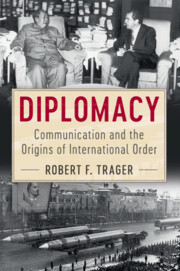Book contents
- Frontmatter
- Dedication
- Contents
- List of Figures
- List of Tables
- Preface
- 1 Can Adversaries Communicate?
- 2 How Perceptions of Intentions Form
- PART I THEORY
- 3 The Scope of Demands
- 4 The Risk of a Breach
- 5 Balancing Allies and Adversaries
- 6 Diplomatic Approaches
- PART II EMPIRICAL ANALYSIS
- APPENDICES
- References
- Index
6 - Diplomatic Approaches
from PART I - THEORY
Published online by Cambridge University Press: 25 October 2017
- Frontmatter
- Dedication
- Contents
- List of Figures
- List of Tables
- Preface
- 1 Can Adversaries Communicate?
- 2 How Perceptions of Intentions Form
- PART I THEORY
- 3 The Scope of Demands
- 4 The Risk of a Breach
- 5 Balancing Allies and Adversaries
- 6 Diplomatic Approaches
- PART II EMPIRICAL ANALYSIS
- APPENDICES
- References
- Index
Summary
When Japan told Britain, at the end of the Russo-Japanese War, that Japan would not come to an adjustment of differences with Russia, British statesmen were genuinely reassured. They concluded that they could adopt a stronger negotiating position in talks on a cooperative arrangement with Japan. Why did the British draw this conclusion from the Japanese signal and, more puzzlingly, if the British could have been expected to draw this conclusion, why did the Japanese send the signal?
Following the Crimean War, Russian attempts to cultivate close relations with France were a factor in convincing the British that Russia would not help Austria–Hungary in the Second Italian War of Independence. The Russian overtures to France were proof that Russian hostility was greater towards Austria, which had been Russia's ally before the war, than it was toward the powers against which Russia had actually fought in the war. Beyond convincing the British that Russia was resentful towards Austria, which European powers already had reason to understand, Russian diplomacy helped to persuade the British that this resentment would have a significant impact on Russian policy. No public alliance signing was required for these conclusions to be drawn. In fact, diplomats around Europe were able to read the implications of the private diplomatic encounters of which they, through their own networks, became aware. Similarly, in 1910 and 1911, when Germany offered Britain an expanded and exclusive sphere of influence in Persia, the British concluded that Germany wanted a “free hand” in dealing with France and Russia and other neutral powers. Why did the British conclude in these cases that Russia was more hostile to Austria and Germany more hostile towards France and Russia, than the British had believed previously?
This chapter demonstrates that a very simple mechanism allows for inferences of this sort in systems of states. Further, many inferences that may appear very different in kind are in fact similar and can be understood as the results of identical processes of reasoning by the actors involved.
- Type
- Chapter
- Information
- DiplomacyCommunication and the Origins of International Order, pp. 128 - 146Publisher: Cambridge University PressPrint publication year: 2017



